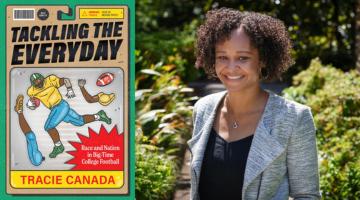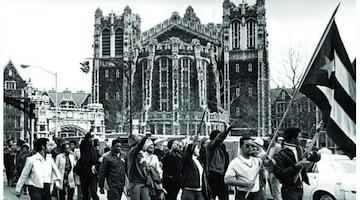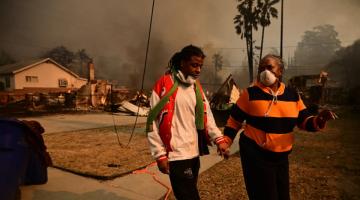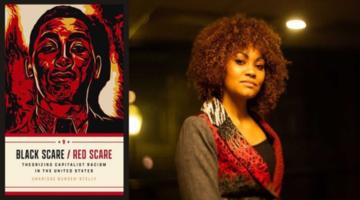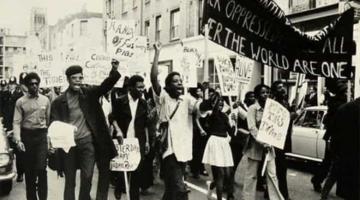In this series, we ask acclaimed authors to answer five questions about their book. This week’s featured author is Karen Antoinette Scott. Dr. Scott is the Chief Black Feminist Physician Scientist, Founding CEO, and Owner of Birthing Cultural Rigor, LLC, with nearly 30 years of supporting women, girls, and gender expansive people across the sexual, reproductive and perinatal life course. Her book is SACKRED Birth: Mobilizing A New Quality Paradigm in Obstetric Care.
Roberto Sirvent: How can your book help BAR readers understand the current political and social climate?
Karen Antoinette Scott: SACKRED Birth: Mobilizing A New Quality Paradigm in Obstetric Care is both a call to action and a new paradigm for advancing justice in the professionalization and provision of obstetric care, designed specifically for readers who recognize that health is political, and that hospitals are not neutral spaces. SACKRED Birth helps BAR readers understand the political and social climate of obstetric care in hospital settings by activating and amplifying Black women’s experiences not as afterthoughts but as evidence—as data and as direction for transformation. In this climate where anti-Blackness and misogynoir are systematized into policy, practices, payment structures, and professional norms, I argue that Black women’s lived experiences of harm, healing, resistance, and resilience during childbirth hospitalization must define what we mean by “quality” and “safety.”
This book names obstetric racism as a function of structural violence during childbirth hospitalization and reclaims the power of Black feminist epistemologies, methodologies, and moral authorities in clinical spaces. Through the SACKRED Birth Framework, I offer a new blueprint that politicizes patient safety, reframes meanings, manifestations, and measurement as justice work, and insists that care cannot be high-quality if it is not also equitable, ethical, and free of emotional and physical harm. In a time of growing public health and health care hypocrisy—where institutions claim equity but refuse accountability—SACKRED Birth activates the power of readers to understand how anti-Black state violence shows up during labor, childbirth, and immediate postpartum in hospitals, and how Black women and gender expansive individuals are already leading the movement to dismantle it. This is not just a book about birth. It is a Black feminist intervention into the entire field of health care, demanding a radical reimagination rooted in justice, transparency, truth-telling, and transformation.
What do you hope activists and community organizers will take away from reading your book?
I hope activists and community organizers will feel seen, affirmed, heard, held, resourced, and re-ignited by this book—grounded in the truth that Black women’s voices, visions, and lived experiences are not only legitimate data but also liberatory technologies. SACKRED Birth offers language, frameworks, and tools to name and confront obstetric racism as an extension of the same anti-Black, anti-feminist, anti-liberatory systems activists have been fighting across sectors. This is not just a book about medicine—it’s a political declaration that says: no more detached concern, no more neutral apathy, no more data disparity porn, no more pathologization of Blackness and Black wombs, no more death and degradation under the guise of care.
I want organizers to see how the hospital has functioned as a site of reproductive violence and as a terrain of resistance. Through this book, they can access the SACKRED Birth Framework and the patient-reported experience measure of obstetric racism©, also known as the PREM-OB Scale® suite, as radical Black feminist movement-informed, evidence-based tools for community organizing, policy advocacy, clinical and legal accountability, and care transformation. My hope is that readers will use this work to demand new obstetric quality and patient safety ethics, knowledge, leadership, science, measurement selection and monitoring strategies, data quality and accessibility and community participation and partnership to disrupt the dominance of hospital-based quality epistemology, and to organize around the idea that Black birthing people’s experiences are the outcome. This book is a love offering to our movement—rooted in the brilliance of Black mothers and grounded in the belief that SACKRED birth is not a privilege, it’s a human right.
We know readers will learn a lot from your book, but what do you hope readers will un-learn? In other words, is there a particular ideology you’re hoping to dismantle?
There are at least two deeply entrenched, harmful ideologies I am asking readers to unlearn—urgently and unapologetically. I hope readers un-learn the idea that safety during childbirth is solely defined by the physical absence of injury. That narrow definition is not only incomplete—it’s complicit. It upholds another dangerous ideology: that positive outcomes automatically mean positive experiences. But Black mothers and birthing people can walk away from childbirth physically intact and psychologically and spiritually broken into pieces of their former selves. A Black mother can experience a normal, uncomplicated vaginal birth and still be deeply harmed—violated, silenced, coerced, or dehumanized – by the institutional, departmental, and shift culture and norms. Survival is not the same as safety. Safety must include the presence of love, empathy, humanity, and a sense of being seen, heard, and valued
Second, I hope readers un-learn the assumption that the absence of perinatal pathology is equivalent to the presence of perinatal equity. That logic makes it easier to target the patient—through health education, compliance strategies, or “culturally competent” handouts—while ignoring the roles of clinicians, institutions, disciplines and structural racism and obstetric racism in causing harm. When we individualize risk and pathologize Black reproducing bodies and Black births, we distract from the systemic transformation required to advance quality, safety, and equity.
Together, these two ideologies fuel a clinical and policy obsession with reducing the rate of harmful outcomes without improving the experience of care. But a system that lowers mortality while continuing to traumatize Black women is still violent. SACKRED Birth demands that we center patient-reported experiences—of autonomy, participatory communication, anti-racism, anti-misogynoir, and dignity—as legitimate, measurable, and necessary indicators of quality. Until we do that, we’re not improving maternal health. We’re just making oppression harder to measure, monitor, and mitigate.
Which intellectuals and/or intellectual movements most inspire your work?
My work is profoundly shaped by Black feminist thought and praxis—especially the radical clarity, courage, and care of the Combahee River Collective. Their insistence that “if Black women were free, it would mean that everyone else would have to be free since our freedom would necessitate the destruction of all systems of oppression” is both an analytic and an aspiration that guides SACKRED Birth. I write, research, and design not from the margins, but from the center of that truth.
The living wisdom of bell hooks, Audre Lorde, and Leith Mullings sustains me. hooks taught me that love and justice must be present in how we name harm and imagine care. Lorde’s words remind me that my rage at obstetric racism is not only valid but a source of power. And Leith Mullings offered a framework, the Sojourner syndrome, to make visible the embodied impact of structural violence—a framework I carried into every phase of developing the PREM-OB Scale® Suite.
Byllye Avery’s life work and legacy made space for me as a Black woman physician to be a truth-teller and community healer—not just a clinician. The reproductive justice movement, born from the leadership of twelve Black women, gives language and legitimacy to what I have long known: that health is about power, dignity, and the ability to thrive.
Finally, abolition feminism and transformative justice call me to reimagine maternal health without surveillance, coercion, or punishment. These movements inspire me to co-create systems of care rooted in accountability, healing, and the full humanity of Black women, girls, and gender expansive people. SACKRED Birth is not just scholarship—it’s a love letter, a battle cry, and a blueprint grounded in these revolutionary traditions.
Which two books published in the last five years would you recommend to BAR readers? How do you envision engaging these titles in your future work?
Two books I would recommend to BAR readers are Reproductive Injustice: Racism, Pregnancy, and Premature Birth by Dána-Ain Davis and Care Work: Dreaming Disability Justice by Leah Lakshmi Piepzna-Samarasinha. Each, in its own way, provides a radical blueprint for reimagining health, care, and justice beyond the confines of biomedical violence and racial capitalism.
Davis’ ethnographic brilliance in Reproductive Injustice was the intellectual and emotional permission slip I needed to speak truthfully and publicly about obstetric racism—not as an abstract theory, but as lived experience. She gave language to the intimate betrayals Black birthing people endure in systems that deny their knowledge and humanity. In my future work, I will continue to cite and expand on Davis’ insights as I develop cross-cultural translations of the PREM-OB Scale® suite in Portuguese and Spanish for communities with shared histories of anti-Black racism, eugenics, chattel slavery, and plantation colonialism and continue to intervene in hospital-based care improvement and implementation initiatives through culturally and scientifically rigorous, patient-reported quality metrics grounded in Black feminist praxis.
Leah’s Care Work invites us to dream beyond reform, toward an ecosystem of care centered on interdependence, access, and dignity. Their framing of disability justice as collective liberation echoes my own insistence that survival is not enough—we must build systems where Black mothers and birthing people, and their given and chosen family, can thrive. I envision weaving disability justice principles into SACKRED Birth implementation strategies, especially as I collaborate with youth, doulas, and community scholars to design patient safety bundles and care models that are responsive, relevant, relational, and revolutionary.
These books challenge us to build what has never been built: care systems that don’t harm us, but hold, honor, and heal us.
Roberto Sirvent is the editor of the Black Agenda Report Book Forum.


